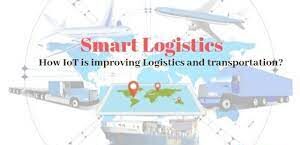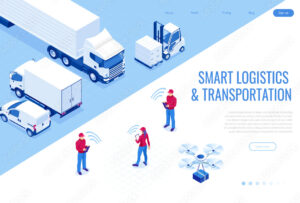Introduction:
The logistics industry is constantly evolving, and one of the latest developments that is making waves is the growth of smart logistics. This concept refers to the use of advanced technologies such as the Internet of Things (IoT), artificial intelligence (AI), and big data analytics to streamline and optimize logistics operations. In this article, we will explore what smart logistics is, how it works, and the benefits it offers.
What is Smart Logistics?
Smart logistics is an innovative approach that leverages digital technologies to enhance the efficiency and effectiveness of logistics operations. By using IoT-enabled devices, such as sensors and tracking systems, logistics companies can gather real-time data on their assets, including vehicles, containers, and cargo. This data can then be analyzed using AI and big data analytics tools to gain insights into various aspects of logistics operations, such as inventory management, route planning, and predictive maintenance.

How Smart Logistics Works:
At the heart of smart logistics is the use of IoT-enabled devices that are embedded in logistics assets. For instance, sensors can be placed on cargo containers to track their location, temperature, and humidity. These sensors can communicate with other devices, such as GPS trackers and telematics systems, to provide real-time data on the location and condition of the cargo. This data is then transmitted to a centralized system that uses AI and big data analytics to analyze it.
One of the key benefits of smart logistics is that it enables logistics companies to monitor their assets in real-time, thereby improving visibility and control. By knowing the exact location and status of their assets, logistics companies can make informed decisions about how to allocate resources, plan routes, and manage inventory.

Benefits of Smart Logistics:
Smart logistics offers numerous benefits to logistics companies, including:
- Enhanced efficiency: By using real-time data and analytics, logistics companies can optimize their operations, reduce waste, and improve overall efficiency.
- Improved visibility: Smart logistics provides real-time visibility of assets, which improves the tracking of shipments and enables companies to respond to issues quickly.
- Better customer service: With real-time data, logistics companies can provide accurate and timely updates to customers, enhancing their overall experience.
- Reduced costs: By optimizing operations and improving efficiency, logistics companies can reduce costs associated with transportation, storage, and inventory management.
Challenges of Smart Logistics:
While logistics offers numerous benefits, it also presents several challenges that logistics companies need to overcome. One of the biggest challenges is the need for significant investment in technology infrastructure and talent. For instance, deploying IoT-enabled devices, developing AI algorithms, and building big data analytics capabilities requires significant investment in hardware, software, and talent.
Another challenge is the need to integrate different technologies and systems. Many logistics companies use a range of different technologies, such as transportation management systems, warehouse management systems, and GPS trackers, which can be difficult to integrate into a single platform. Without effective integration, data silos can arise, which can limit the ability of companies to gain a holistic view of their operations.
Finally, there is the challenge of data privacy and security. With the increased use of IoT-enabled devices and big data analytics, logistics companies are collecting and processing vast amounts of sensitive data, including customer information, product data, and operational data. This data needs to be securely stored and protected from cyber threats, which requires robust cybersecurity measures and protocols.

The Future of Smart Logistics:
Despite these challenges, the future of logistics looks bright. As technology continues to advance and costs decrease, more logistics companies are likely to adopt smart logistics solutions. In addition, governments and industry bodies are increasingly recognizing the importance of smart logistics in improving efficiency and reducing environmental impact.
One area where smart logistics is expected to have a significant impact is in the last mile delivery. With the growth of e-commerce and the rise of same-day delivery, logistics companies are under pressure to deliver goods quickly and efficiently. By using IoT-enabled devices and AI-powered algorithms, companies can optimize their last mile delivery operations, reduce congestion, and improve delivery times.
Moreover, logistics can also have a significant impact on sustainability. The logistics industry is a major contributor to greenhouse gas emissions, with road transportation accounting for a significant portion of these emissions. By optimizing routes and reducing idle time, smart logistics can reduce fuel consumption and emissions, thereby contributing to a more sustainable future.
Another potential benefit of smart logistics is that it can help logistics companies to stay competitive in an increasingly globalized and interconnected world. As the world becomes more connected, customers are demanding faster, more reliable, and more transparent delivery services. By adopting logistics solutions, logistics companies can meet these demands and provide a differentiated service to their customers.
Finally, smart logistics can also play a role in disaster relief and humanitarian aid. In the event of a natural disaster or humanitarian crisis, logistics companies need to be able to respond quickly and efficiently to deliver essential supplies to affected areas. By using IoT-enabled devices and big data analytics, logistics companies can gain real-time insights into the situation on the ground and plan their operations accordingly.
To achieve success with logistics, companies need to start by identifying the areas where they can benefit from technology and innovation. This could involve conducting an audit of their operations to identify areas where they could improve efficiency, reduce costs, and enhance customer service. Based on this analysis, companies can then determine which smart logistics technologies and solutions would be most effective for their business.
Next, companies need to invest in the necessary technology infrastructure and talent to support their logistics initiatives. This could involve hiring data scientists, software developers, and other technology professionals with experience in IoT, AI, and big data analytics. Companies also need to invest in the necessary hardware, software, and networking infrastructure to support their logistics operations.
Conclusion:
Smart logistics is transforming the logistics industry by enabling companies to optimize their operations, reduce costs, enhance customer service, and contribute to a more sustainable future. While there are challenges to overcome, the benefits of smart logistics are significant, and companies that adopt this approach are likely to gain a competitive advantage in the marketplace. As technology continues to advance, the future of smart logistics looks promising, and the logistics industry is set to become more efficient, sustainable, and customer-centric than ever before.



